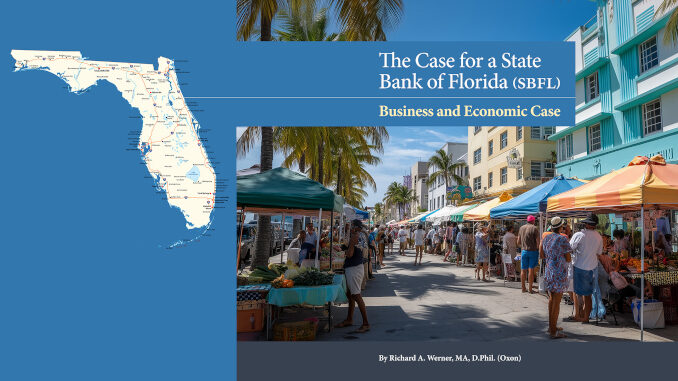
By Richard A. Werner, MA, D.Phil. (Oxon)
Executive Summary
This document presents to state legislators in Florida the case for setting up a State Bank of Florida (SBFL). SBFL would act as a second-tier bank, interposed between the Federal Reserve Bank of Atlanta (FRBA) and the Florida State Government (FSG) on the one hand, and small banks (community banks, credit unions, etc.) operating in Florida on the other. The goal of SBFL is not to compete with small banks for loan and deposit market shares, but to support them with loan participations and purchases, as well as other forms of backup as a larger, state-owned bank that is tasked to ensure the future of a diverse banking sector and thriving small banks in Florida. Because small banks and small firms depend on each other in a symbiotic relationship, setting up SBFL would support small businesses in Florida in gaining access to funding and deposit markets, thus helping the economy of Florida.
Here are some of the key takeaways:
- Minimal cost: Setting up SBFL would cost less than 0.43% of the State of Florida’s annual expenditures for FY 2024. However, notably, the founding funds would not need to come from the annual budget but can be procured from capital expenditure or reserve accounts, since they represent a profitable investment that will bring returns.
- Dividends: The founding contribution would be a one-off investment, after which the SBFL would be able to stand on its own feet and, after an initial launch period, would pay handsome dividends to the State of Florida, since banking is generally one of the more profitable business lines.
- Productive lending: SBFL would expand the amount of funding available to Florida’s 66 community banks (defined as those with total deposits <$1 billion and with >50% of their deposits booked in Florida) by 20% over the course of its first 10 years of operation. Since small bank lending tends to be allocated for productive purposes (business investment), the additional lending will be non-inflationary, and it will increase GDP and tax revenues. This is why countries with many small banks are often able to achieve high economic growth in the long run.
- Support for community banks: SBFL will not compete for deposit or loan market shares with community banks; rather, it will provide them with funding in the form of loan purchases and loan participations in larger volume lending operations. Other forms of support are also provided.
- Support for state government: SBFL will act as depositary for the Florida State Government. It will also be able to provide funding to the FSG, enabling a higher effectiveness of fiscal policy (than if public borrowing is undertaken via bond issuance).
- Number of community banks: The number of community banks in Florida has fallen by 80.9% since 1990. The Florida banking system is now relatively concentrated: 10 banks account for 67.9% of the deposit market (above the U.S. average of 60%). North Dakota, thanks to its state-owned bank, has avoided such high concentration of its banking system.
- Bank concentration: Banking system concentration is bad for small firms, which depend on bank funding and particularly on bank loans from small banks (“community banks”).
- Existing precedent: SBFL will follow the example of the Bank of North Dakota, the only example of a U.S. state-owned bank that helps community banks with funding.
- State sovereignty: SBFL would counter the recent move by the Federal Reserve of exploring the introduction of a USD central bank digital currency (CBDC, or “Digital Dollar”), which could adversely affect the capacity of banks to fund themselves with deposits and trigger deposit outflows from private bank deposits into the central bank balance sheet to CBDC accounts.
- Timing: The era of zero to negative interest rates is over, providing a good environment for setting up new banks.
Read the full report (available as a PDF) HERE. (2-page spread HERE.)
Related at the Solari Report:
Organizing a Sovereign State Bank with Professor Richard A. Werner
Action of the Week: January 20, 2025: Invite Your Legislators to Learn about Sovereign State Banks
Why a Sovereign State Bank Is Good for Tennessee
views: 2
